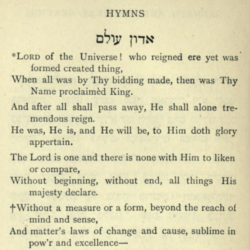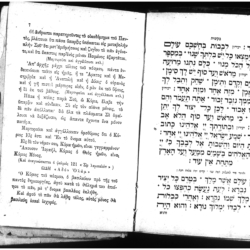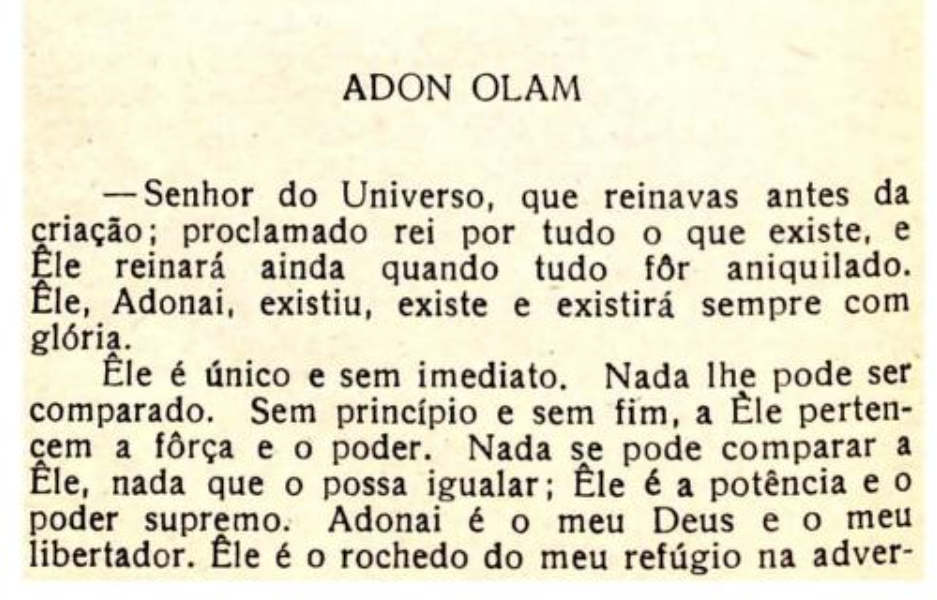| Source (Hebrew) | Translation (English) |
|---|---|
אֲדוֹן עוֹלָם אֲשֶׁר מָלַךְ בְּטֶֽרֶם כׇּל־יְצִיר נִבְרָא׃ לְעֵת נַֽעֲשָׂה כְּחֶפְצוֹ כֹּל אֲזַי מֶֽלֶךְ שְׁמוֹ נִקְרָא׃ |
The Lord of the World, had supreme Dominion before any Thing formed, was created. And when all Things were made according to his own good Pleasure: Then, the KING, was his Name proclaimed. |
וְאַֽחֲרֵי כִּכְלּוֹת הַכֹּל לְבַדּוֹ יִמְלֹךְ נוֹרָא׃ וְהוּא הָיָה וְהוּא הֹוֶה וְהוּא יִֽהְיֶה בְּתִפְאֲרָה׃ |
And after the Consummation of all Things he alone shall reign in awful Majesty. He ever was, is now, and ever shall exist in Glory. |
וְהוּא אֶחָד וְאֵין שֵׁנִי לְהַמְשִׁיל לוֹ לְהַחְבִּירָה׃ בְּלִי רֵאשִׁית בְּלִי תַּכְלִית וְלוֹ הָעֹז וְהַמִּשְׂרָה׃ |
HE is ONE, nor is there a second, with him to be compared, or him to equal. Without Beginning, without End, and unto him alone appertaineth, the Power, and the Dominion. |
בְּלִי עֵֽרֶךְ בְּלִי דִמְיוֹן בְּלִי שִׁנּוּי וְהַתְּמוּרָה׃ בְּלִי חִבּוּר בְּלִי פֵרוּד גְּדׇל־כֹּחַ וְהַגְּבוּרָה׃ |
Without Comparison, without Similitude: Unchangeable, and unalterable. Without Union of Parts, without Division: Great in Power and Might. |
וְהוּא אֵלִי וְחַי גּֽוֹאֲלִי וְצוּר חֶבְלִי בְּיוֹם צָרָה׃ וְהוּא נִסִּי וּמָנוֹס לִי מְנָת כּוֹסִי בְּיוֹם אֶקְרָא׃ | |
בְּיָדוֹ אַפְקִיד רוּחִי בְּעֵת אִישַׁן וְאָעִֽירָה׃ וְעִם רוּחִי גְּוִיָּתִי אֲדֹנָי לִי וְלֹא אִירָא׃ |
In his Hand do I commend my Spirit, while I sleep, or when I am awake: And together with my Spirit, my Body also. For when The LORD is for me, I have nothing to fear. |
This is Isaac Pinto’s English translation of Adon Olam from Prayers for Shabbath, Rosh-Hashanah, and [Yom] Kippur (1766), p. 29. The translation there appears without the Hebrew. The Hebrew text of the piyyut set side-by-side with the translation was transcribed from Rabbi David de Sola Pool’s Tefilot l’Rosh haShanah (1937).
Adon Olam is a piyyut that became popular in the 15th century and is often attributed to Solomon ibn Gabirol (1021–1058) and less often to Sherira Gaon (900-1001), or his son, Hai ben Sherira Gaon (939-1038). The variation of the piyyut appearing here is the 12 line version familiar to Sepharadi congregations. (There are also fifteen and sixteen line variants found in Sepharadi siddurim. The Ashkenazi version has ten lines.)
Source(s)


“אֲדוֹן עוֹלָם (מנהג הספרדים) | Adōn Olam, translation by Isaac Pinto (1766)” is shared through the Open Siddur Project with a Creative Commons Public Domain Dedication 1.0 Universal license.








Leave a Reply